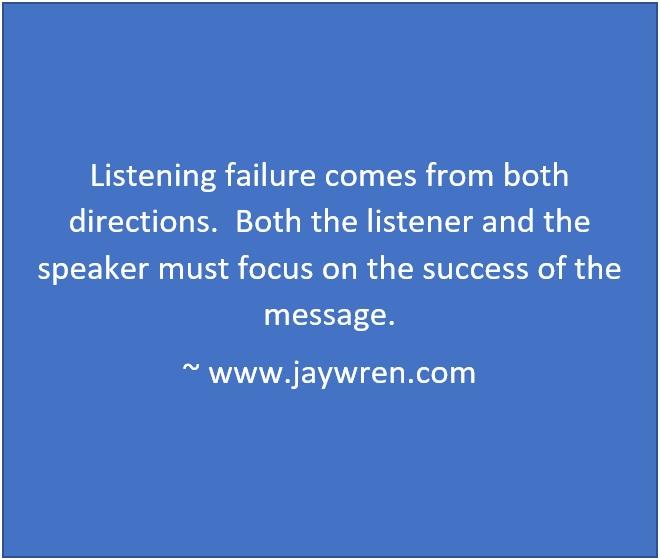Listening Failure: What makes us ineffective listeners? What are solutions to overcoming listening failure? Here are steps for more effective communication.
The Value of Overcoming Listening Failure
Effective listening is important in all parts of our lives. In our personal relations, effective communications can help us build strong, long-term bonds. In networking, effective communications can help us create trust with the new people we meet. Whether interviewing for a job or building success in our current job, effective communications will help us create success.
Take Away the Bias
Listening failure happens on both sides of the table. To prevent these failures, both the listener and the speaker must keep an open mind. They must set aside their feelings and focus on the meaning of the message.
Better Speakers Create Better Listeners
More effective speakers deliver clear, concise presentations. They connect their message to the conscious mind of the speaker. The seek feedback from the listener to create a more effective message.
Great Listeners Create Better Speakers
The most effective people know how to ask great questions and to learn from listening. ~ www.jaywren.com
Great listeners look for the message and help the speaker present their information. They listen without judgement. When appropriate, they ask questions and collaborate in making the presentation a discussion.
Tactfully, of course, great leaders teach the team how to give persuasive presentations.
Steps to Prevent Listening Failure
For the listeners and the speaker, there are basics to have great communications.
- Stop what you are doing.
- Silence your phone.
- Look at the person who is speaking.
- Ask questions when you need clarification.
- Examine the discussion to see whether there is a recommended action.
- At the conclusion, repeat the subject to your speaker and ask if they have additional, helpful information.
Conclusion
In conclusion, listening failure happens on both sides of the table. To prevent these failures, both the listener and the speaker must keep an open mind. They must set aside their feelings and focus on the message not the messenger. Both sides must eliminate distractions and focus on creating effective communications.

